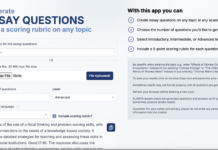Hughes, M. (2017) Facebook is letting Groups create online learning courses – what could possibly go wrong? The Next Web, 1 June
It has been a depressing week for me, with terrorist bombings, Trump’s environmental blunder, trade wars and political uncertainty in British Columbia. We are currently without an effective government but that seems not to be a problem for anyone.
However, I did have one good laugh this week that I want to share with you. This came from Matthew Hughes blog (Matthew is at the University of Roehampton, in the UK). He is reporting on news (fake news?) that Facebook is enabling anyone running a Facebook Group to create their own online courses. As he says, tongue in cheek: what could possibly go wrong from an organization with such high standards of credibility?
- Well, we might begin by looking at the problems that collaborative MOOCs have been facing, especially moderating discussions. Who and how will that moderation be done?
- Then there’s the likely make-up of the participants – will this just be more opinion swapping between people with the same world view?
- Who will accredit or validate the knowledge in such courses? The learners themselves, probably – and look again at the problems with that in many MOOCs.
- how will the data that Facebook collects through such Groups be used? You will never know.
This is not to argue that good quality online courses will be impossible through Facebook Group – but once the necessary quality standards are applied, how will it then look different from any other online course delivered on other platforms? What’s the added value?
My point here is that technology alone is never a solution to an educational issue. Do the benefits of the technology (the added value) outweigh the negatives – in this case Big Brother watching you?
One last point while I’m on about Facebook. A Facebook account is a true zombie. You cannot kill it. I ‘signed out’ of Facebook within six months of joining it in 2007, for privacy reasons primarily, and have never used it since, but I still get e-mail messages from them asking me to look at someone I know who has just posted something on Facebook, and I keep getting messages from Facebook to log back in. GO AWAY, FACEBOOK!!!! You are not wanted here.










 Dr. Tony Bates is the author of eleven books in the field of online learning and distance education. He has provided consulting services specializing in training in the planning and management of online learning and distance education, working with over 40 organizations in 25 countries. Tony is a Research Associate with Contact North | Contact Nord, Ontario’s Distance Education & Training Network.
Dr. Tony Bates is the author of eleven books in the field of online learning and distance education. He has provided consulting services specializing in training in the planning and management of online learning and distance education, working with over 40 organizations in 25 countries. Tony is a Research Associate with Contact North | Contact Nord, Ontario’s Distance Education & Training Network.


You can kill the zombie; you only deactivated the account, but there are steps to put a stake through its heart. They make you log in to see this but it’s via http://www.facebook.com/help/delete_account I’ve done it twice and can confirm that when I went back once more all my info was not there (I’m never going back)
Thanks, Alan – done it!
Thanks Tony and I hope you’re stay in Barcelona goes well – It’s a fantastic and highly distracting city!
Re: Facebook for education, Paul Kirschner (OU of the Netherlands) has been highly critical of using both Facebook and Twitter for such things as well as for PLNs/CPD.
The arguments I’ve hear in favour of using Facebook and Twitter from teachers and curriculum developers (even at the UK’s OU) have been as coherent as “Because social media!” I’d like to hear something more carefully thought through in favour in case there are some rational reasons for doing so.
Some articles by Kirschner on Facebook:
Kirschner, P. and Neelen, M. (2016) ‘Twitter® and Facebook® to manage personal knowledge in the learning process: Time to mark time?’, 3 Star Learning Experiences, Blog [Online]. Available at https://3starlearningexperiences.wordpress.com/2016/01/05/twitter-and-facebook-to-manage-personal-knowledge-in-the-learning-process-time-to-mark-time/
Kirschner, P. A. and Karpinski, A. C. (2010) ‘Facebook® and academic performance’, Computers in Human Behavior, Online Interactivity: Role of Technology in Behavior Change, vol. 26, no. 6, pp. 1237–1245 [Online]. DOI: 10.1016/j.chb.2010.03.024
Kirschner, P. A. (2015) ‘Facebook as learning platform: Argumentation superhighway or dead-end street?’, Computers in Human Behavior, vol. 53, pp. 621–625 [Online]. DOI: 10.1016/j.chb.2015.03.011